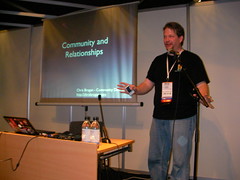The Revocation of PodCamp Rule Four
In the beginning, there were seven rules of BarCamp.
1st Rule: You do talk/blog about BarCamp. (this later broke into two separate rules)
2nd Rule: If you want to present, you must write your topic and name in a presentation slot.
3rd Rule: Only three word intros.
4th Rule: As many presentations at a time as facilities allow for.
5th Rule: No pre-scheduled presentations, no tourists.
6th Rule: Presentations will go on as long as they have to or until they run into another presentation slot.
7th Rule: If this is your first time at BarCamp, you HAVE to present.
PodCamp Boston 1 changed a lot of these rules, as Chris Brogan and I found at least at BarCamp Boston that they either weren’t adhered to or they made people unnecessarily uncomfortable, particularly rules 5 and 7.
The rules of PodCamp evolved to:
1. All attendees must be treated equally.
2. All content must be released under Creative Commons.
3. All attendees must be allowed to participate.
4. All sessions and events must be free of charge to attend.
5. All sessions must obey the Law of 2 Feet.
6. The event must be new-media focused.
7. The financials must be fully disclosed in an open ledger.
At PodCamp Boston 2, rule 4 was revoked.
1. All attendees must be treated equally.
2. All content must be released under Creative Commons.
3. All attendees must be allowed to participate.
5. All sessions must obey the Law of 2 Feet.
6. The event must be new-media focused.
7. The financials must be fully disclosed in an open ledger.
Our reasoning for the revocation of rule 4 is based on feedback from the session on PodCamp Retrospective and Prospective: Where Do We Go From Here, as well as the hallway session on the state of new media, plus healthy discussions with folks throughout the weekend.
Some additional numbers and facts:
1,357 people registered for PodCamp Boston 2 (sponsored by VON, thank you!)
Approximately 650 attended, or 52.1% no show rate.
212 people registered for the Saturday night party.
Virtually all plus an additional 25 at the door actually attended (paying 20 cash), making for almost zero no-show rate, even with a9.99 expense coverage fee.
To give you some additional perspective, 1,036 shirts were printed (paid for by Foneshow, thank you!), as well as 1,200 name badges, 1,500 lanyards, etc. The name badges are headed straight for a recycling center; the lanyards don’t take up much space and will be stuffed in my office at the Student Loan Network. The shirts are likely to head either to Father Bill’s Day Shelter or Pine Street Inn for dispersal to the homeless.
Each of those things cost money and generated overage which has a financial and environmental impact.
Some final, more personal numbers. PodCamp Boston organization really ramped up in June of this year for me. For 3 – 5 hours per night (more on the weekends, and more as the event got closer), PodCamp Boston -was- my life. Just about everything outside of work and family took a major hit in order to gather the resources, people, and materials to make it happen. 147 days, or about 90 work-days’ time (assuming 8 hour days) to make it happen, and that’s just my time, not counting the other organizers who busted their asses to make it happen.
Why was rule 4 revoked, and what does it mean?
Rule 4 was revoked to give PodCamp organizers more freedom, more choice, and more options for how they want their events to be run, and how they want to deal with the very real and tangible costs of operating an event.
Rule 4 also gives organizers a way to encourage commitment to the events that they work relentlessly to create.
Before the firestorm really gets going, here’s what rule 4’s elimination does NOT mean:
– PodCamp organizers are not required to charge money. They are given the option to do so.
– PodCamp organizers do not have to sell tickets. A variety of commitment mechanisms have been discussed, such as a refundable deposit paid back to attendees after the event begins.
– PodCamp organizers do not have to have a set price. Something as simple as “pay what you think it’s worth, as long as it’s greater than 1 cent” might be effective.
– PodCamp does not need to become a formal conference, such as the excellent VON and Video on the Net conferences.
Rule 4’s revocation may significantly reduce the number of people who no-show for a PodCamp should organizers choose to charge money, and that’s not a bad thing at all. I’d rather sit in a small room with 100 committed, smart people and jam together than be in a convention center the size of an aircraft carrier with 1,200 people, half of whom are there because there’s nothing more exciting to do on that weekend in town.
Rule 4’s revocation is no more written in stone than the original was, either. If there’s a case where organizers of a PodCamp behave badly, Chris Brogan and I reserve the right to reinstate it.
Laura Fitton said it best in a discussion thread on CC Chapman‘s blog:
The event isn’t, and from what little I understand, never was FREE. In a way, no event ever is. It is subsidized by sponsors and by volunteer hours. You attend for free, because somebody else paid your way. Simple as that.
A final thought. BarCamp, the event by which many compare PodCamp, has in its rules many things, but no requirement that organizers make it free.
The problem posed to the community is this:
How do you reduce the number of no-shows (52.1% attendees, 10% presenters) to under, let’s say, 10%? Solutions and discussions welcome.




